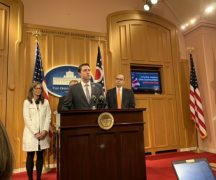In the wake of the coronavirus epidemic, “self-quarantine” has become a household phrase. Memes poking fun at quarantined life have gone as viral as COVID-19 itself and Facebook Live and similar streaming platforms are booming. Slowly the American public is beginning to realize the seriousness of this outbreak. Many students and employees have settled comfortably into their home offices to continue their work online. However, large numbers of working class Ohioans have found themselves having to make an impossible choice between their physical and financial wellbeing.
Non-essential workplaces all over the state have continued face-to-face operations, and in many cases these conditions are posing great risk to employees and the greater community. One of the biggest offenders is factory facilities. The average factory worker in Ohio will receive one, maybe two weeks of paid vacation a year, if they’re lucky. Beyond that, many factory facilities operate on a point system for attendance, which limits the amount of unpaid time off they can take without being automatically terminated.
Even if employees are provided the option to take time off for self-quarantine, it is unpaid. Some locations, such as GKN in Bowling Green, are even continuing to uphold point penalties if you choose to utilize this time. According to indeed.com, average pay for factory workers in Ohio is $12-$13/hr. That’s a gross salary of just $24,960 – $27,040 a year. Many of these employees have families, medical expenses, mortgages, student loan debt, and other big ticket expenses that make it impossible for them to take unpaid time off. And even with the temporary revisions to Ohio’s unemployment policies, those who are asymptomatic and choose to self-quarantine instead of being sent home by their employer are not eligible for unemployment benefits. This leaves workers at the mercy of their employers and unable to safely follow CDC guidelines.
A research study published in The New England Journal of Medicine reports that the COVID-19 virus can live up to 24 hours on cardboard and up to 72 hours on plastic and stainless steel. These are all materials that are commonly handled and shipped from factories. As a result, allowing non-essential production to continue during this time could result in the spread of any infection to other locations around the world.
It is true that some factories make products that are essential in this time of crisis and need to remain in operation. However, employees at these locations should still be provided with the option of adequate paid self-quarantine and sick leave. Furthermore, employees who choose to work should be provided with hazard pay, and adequate sanitization equipment.
However, there are still those who do not make essential products who remain open. TH Plastics for example, primarily produces parts for washers and dryers. The option for a two week unpaid leave is currently available to employees, but this option was not implemented until after 11 workers walked out on March 19th. Furthermore, TH is one of many facilities who are neglecting to follow recommended guidelines regarding physical distance and taking employees temperatures.
Other factories, such as GKN, have made feeble attempts to encourage social distancing by merely removing some of the chairs from the breakroom and moving morning meetings to the floor. To add insult to injury, employees were told that they were not allowed to come into work if they had any symptoms. However, they were also told they would still be penalized per the point system and risk losing their jobs.
While Mike DeWine is helping Ohio lead the way in COVID-19 preventative measures in the U.S., he refuses to directly address the disconnect between current unemployment benefit qualifications and the reality of how businesses are taking advantage of their employees. After all, Ohio’s factory employees do not just include healthy twenty and thirty-somethings, but people with pre-existing health conditions, smokers, pregnant women, the immunocompromised, older adults, and the elderly. Governor DeWine is even quoted having said “I am aware of businesses recklessly risking the lives of their employees and their employees’ families. Please do what is right”. This situation is a matter of global public health. We cannot just warn irresponsible business owners and shake our finger at them like a father does to a spoiled child. Just because factories are more out of the way of the public eye, does not mean that their employees are not as important as the students, teachers, cosmetologists, and food service workers, we have already taken action to protect. We need to learn from our fellow humans overseas and realize that either we prioritize people over money now, or suffer the consequences later. We’re all in this together.
Resources:
https://www.nejm.org/doi/10.1056/NEJMc2004973 (New England Journal of Medicine article)
https://www.13abc.com/content/news/Gov-DeWine-warns-businesses-not-taking-appropriate-COVID-19-actions-568969401.html?fbclid=IwAR22aHN49how696kq6VTbhoaSYNIoVgVmsLAOrLd1wXNJO-K9GHdTnGDabY (source of DeWine quote)
Elai Freed
Bowling Green




